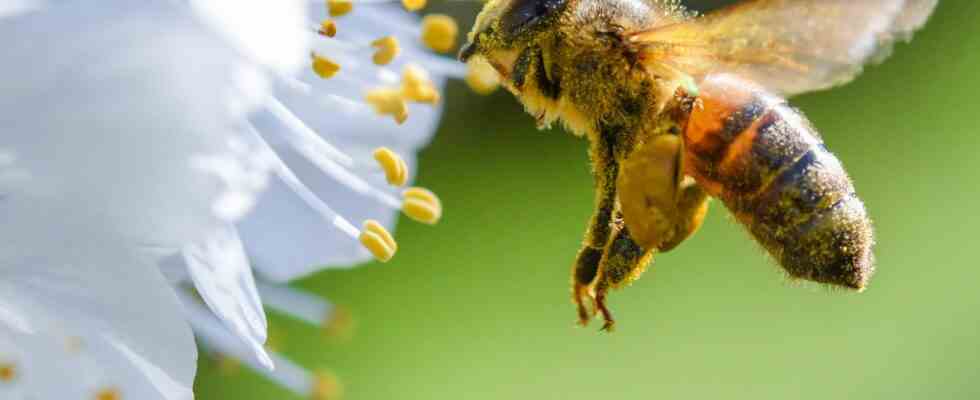Status: 12/07/2022 3:57 p.m
The extinction of species does not only affect the rainforest: In Germany, for example, around 75 percent of all insects have already disappeared. Environment Minister Lemke is therefore calling for more commitment to species protection – and wants to make billions available for it.
Before the world conference on nature in Montreal, the federal government is ambitious. Environment Minister Steffi Lemke from the Greens wants a new global agreement to be adopted to protect biological diversity. Many animal and plant species are threatened not only worldwide, but also in Germany.
The need for action is great: According to scientists, one million of the estimated eight million animal and plant species worldwide are threatened with extinction. It is not just the tropical forests that are affected. Biologist Katrin Böhning-Gaese explains that the decline in biodiversity is also dramatic in Germany. Many bird species are particularly affected here, says the director of the Senckenberg Biodiversity and Climate Research Center ARD Capital Studio. In the agricultural landscape, i.e. on fields, meadows and pastures, the “bird populations there have decreased by around 30 percent in the last 25 years”.
75 percent fewer insects
Partridges and skylarks are considered endangered. Birds in particular are an important indicator of the state of nature – because they depend on intact habitats. But they find them less and less. The loss of biodiversity is also noticeable in insects: 75 percent have disappeared in this country within the last 27 years, as shown by the so-called Krefeld study in 2017 in examined nature reserves.
Above all, but not only, many species are endangered in the agricultural landscape. Development and overfishing, deforestation, environmental pollution and climate change are also causing an ecological emergency for many animal and plant species – in this country and worldwide.
The skylark is considered endangered in Germany.
Image: picture alliance / blickwinkel/M
1.5 billion euros annually for biodiversity
Federal Environment Minister Lemke emphasizes that biological diversity is being lost at a “terribly fast rate”, faster than the average for the last ten million years. The Green politician calls for quick action: She wants the international community to reach an agreement at the World Conference on Nature in Montreal that will ensure a trend reversal: Away from the extinction of species towards the restoration of nature.
One of the main goals of the conference: At least 30 percent of the land and sea areas worldwide should be placed under protection. However, goals alone are not enough for the Environment Minister. The specifications would have to be “underpinned with quality criteria to make it clear what this protection should look like.” According to the minister, this means effective implementation mechanisms, regular reviews and appropriate funding. The federal government has already made commitments. From 2025 at the latest, Germany wants to make 1.5 billion euros available annually for biodiversity worldwide, twice as much money as in previous years. “We humans”, emphasizes Lemke, “are dependent on a healthy nature and its ecological functions”.
Less fertilizers and pesticides, more organic farming and bushes
A lot depends on intact ecosystems, explains the biologist Böhning-Gaese: Clean air, clean water, but also large parts of our food. The scientist explains that many trees and fruits, such as apples and cherries, are pollinated by insects. If there are fewer insects, the yields will also decrease in the end. The species are “intertwined like a network”. If one after the other is lost, then it is as if we were taking meshes out of this network. With fatal consequences – in the end the whole system could tear.
In Germany itself, the Environment Minister wants to advance the protection of moors, forests and bodies of water with an “action program for natural climate protection”. Four billion euros are available for this until 2026. A step in the right direction, says the scientist Böhning-Gaese and at the same time calls for a change of course in agriculture: Less fertilizers and pesticides on the fields, more organic farming, more bushes and trees. Where this is practiced, she sees success. It has been shown that typical birds, such as the skylark, are increasing again. The stocks of white storks have also developed positively.
Climate crisis and species extinction are inextricably linked
Environmental groups are also calling for a change of direction. Among other things, they want uniform and verifiable standards for species protection in order to measure success and check where more needs to be done. The President of the German Nature Conservation Association, Kai Niebert, also relies on the designation of protected areas so that more wilderness can develop. But not only that: In order for people and the environment to benefit, areas could be used in different ways. An example: photovoltaic systems on moorland.
In Germany, but also worldwide, there are many challenges waiting. For Minister Lemke, the World Conference on Nature is about nothing less than “protecting our livelihoods”. She admits that the current geopolitical situation is “not ideal” for international negotiations. Inflation and the energy crisis ensure that the “pressure on the exploitation of natural resources increases”. Despite this, she remains confident of reaching an agreement at the Montreal conference. Many are aware that the climate crisis, but also that of species extinction, must be solved – both are inextricably linked.

